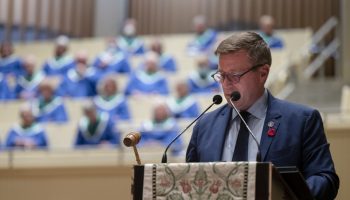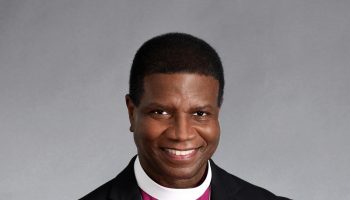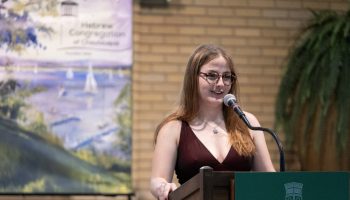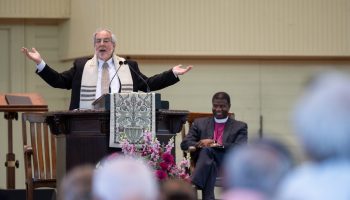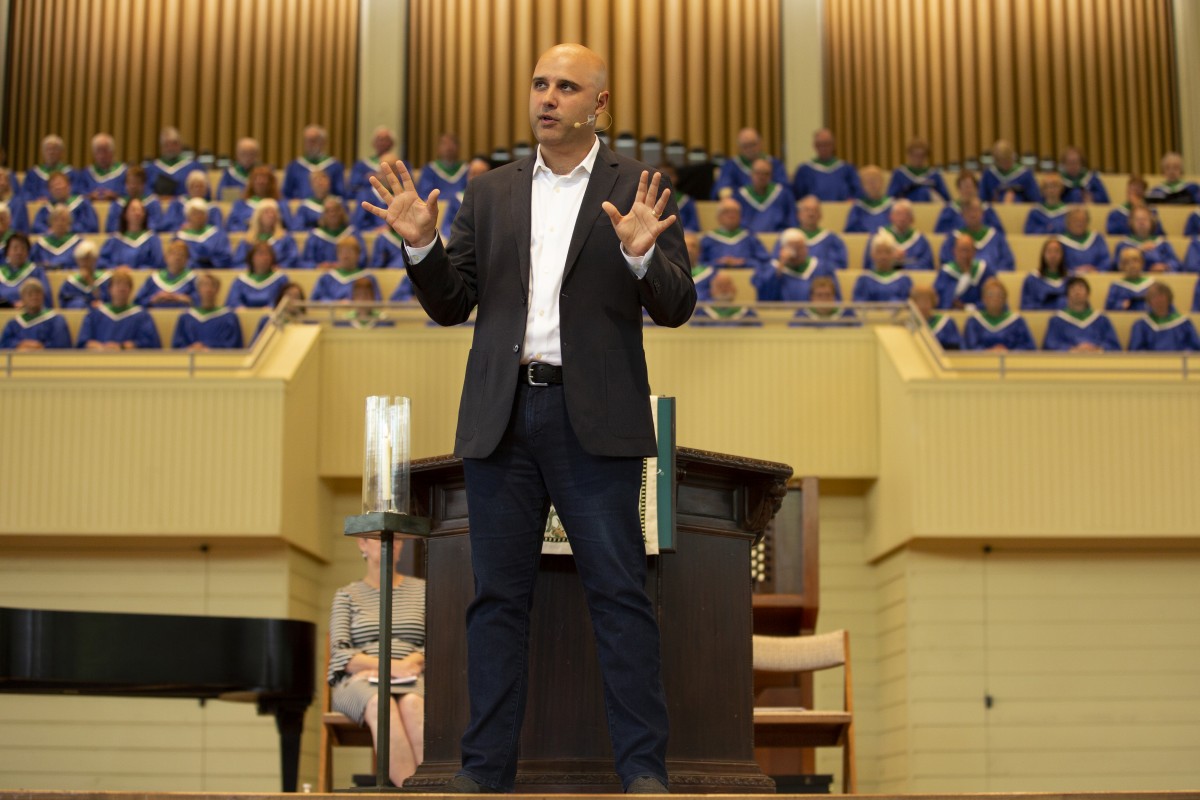
“Human beings were created in God’s image and tasked with dominion over the earth. Dominion can be a problematic word, but it means that humans represent God in his creation to bring it to full flourishing,” said the Rev. Skye Jethani at the 9:15 a.m. Monday morning worship service on July 30 in the Amphitheater.
His sermon title was “Work is a Gift,” and the Scripture text was Genesis 1:26-28, the creation of human beings.
Skye is a nickname, and Jethani called himself “ethnically ambiguous.” His father came from India and his mother is of Scandinavian background.
“I did not know my real name was Akash until I was 10,” he said.
An aunt came from India to visit and brought him and his brother identity bracelets.
“I told her that was not my name and looked at my parents for confirmation. They told me that was my actual name,” Jethani said. “I learned that at the same time I learned that Darth Vader was really Luke Skywalker’s father.”
Jethani faced a dilemma when he was 18: What name would he use in college? He had always been teased about his name, Skye, and thought that with a new name he would have a new identity in college.
“I could choose my otherness and be Akash, or I could choose conformity and use my middle name, Charles,” he said.
In American culture, identity is thought to be self-constructed.
“‘What is your name?’ is often followed by the question, ‘What do you do?’ ” he said.
Choosing a name and a vocation can fill young people with anxiety.
Jethani counseled a student named Brian who, at the end of the second semester of his junior year, was wondering if he had wasted his time and his parents’ money in college.
Brian had always wanted to be a cardiologist, and now he was second-guessing himself, thinking that he should become a missionary. When Jethani asked him why, Brian said, “I want my life to count for something that matters.”
At the core of Brian’s identity was his vocation, and his choice of vocation would define his value.
But, Jethani said, Brian’s thought about his vocation was shaped by “vocational narcissism.”
“We think that vocation is all about me and my value,” Jethani said.
Professor Brad Bushman of Ohio State University found that students got more joy out of feeling valuable than from sex or money.
Vocational narcissism can shape pastors as well as politicians or stock brokers, Jethani said. This view traps people and prevents them from being a vessel of love.
“They use the world to validate themselves,” he said.
In trying to decide what name to use in college, Jethani asked his mother why she gave him a Hindi name. What he did not know was when his father met his mother, he was already a widower whose first wife had died of cancer. He also had a 2-year-old son.
“My brother is darker than I am, but I always thought it was because he drank Hershey’s Chocolate Syrup straight from the can,” Jethani said.
Jethani’s mother had fallen as much in love with the child as with the man who would become her husband.
“My name was a gift from my mother to my brother so he would not be the only child with a Hindi name,” Jethani said. “I had been thinking about my name with all the wrong assumptions. It was not about me.”
Vocation is not something we choose; it is something we receive.
“Our work is a reflection of God’s identity and our neighbor’s value,” Jethani said. As the Apostle Paul wrote to the Ephesians, we work to have something to share with others.
“We need to escape vocational narcissism for vocational generosity, to find our deepest identity in something other than work.”
When Jesus was baptized, God called him “my beloved son with whom I am well pleased.”
“That was before he had preached a sermon, called the disciples, experienced temptation or died on the cross,” Jethani said.
Theologian Henri Nouwen wrote that identity and value are not attached to vocation but are rooted in God. Work can then be released to show the value of others.
Brian, the student who Jethani was counseling, came to see him for about six months. They talked about prayer and God’s presence within and delight in Brian.
Brian’s anxiety about his future lessened as many people confirmed to him that his choice should be medicine. He had thought about missions because in his Christian community, being a missionary was the most significant vocation.
“But Brian would not have been a good cross-cultural leader. He would not be able to give to the world, just get affirmation from the world,” Jethani said.
He said we have to “make work function for the common good.”
“Work is about God’s identity and our neighbor’s value,” he said. “Work is ultimately a gift of God to the world through which you represent him wherever you go.”
The Rt. Rev. V. Gene Robinson, vice president of religion and senior pastor at Chautauqua, presided. The Rev. Carmen Perry, pastor of Hurlbut Memorial Community Methodist Church, read the Scripture. The Motet Choir sang “O Jesus, My Savior” by David W. Music. Jared Jacobsen, organist and coordinator of worship and sacred music, directed the choir. The Randell-Hall Memorial Chaplaincy and the Geraldine M. and Frank E. McElree Jr. Chaplaincy Fund provide support for this week’s services.

